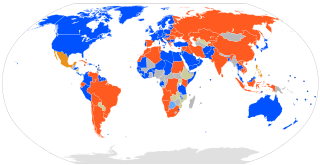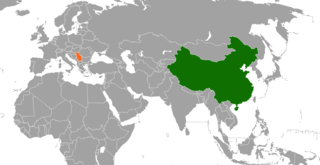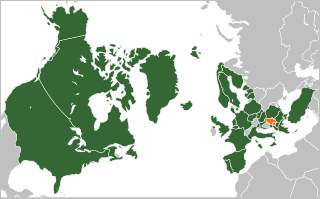
The United Nations Interim Administration Mission in Kosovo (UNMIK) is the officially mandated mission of the United Nations in Kosovo. The UNMIK describes its mandate as being to "help the United Nations Security Council achieve an overall objective, namely, to ensure conditions for a peaceful and normal life for all inhabitants of Kosovo and advance regional stability in the Western Balkans."

United Nations Security Council resolution 1244, adopted on 10 June 1999, after recalling resolutions 1160 (1998), 1199 (1998), 1203 (1998) and 1239 (1999), authorised an international civil and military presence in the Federal Republic of Yugoslavia and established the United Nations Interim Administration Mission in Kosovo (UNMIK). It followed an agreement by Yugoslav President Slobodan Milošević to terms proposed by President of Finland Martti Ahtisaari and former Prime Minister of Russia Viktor Chernomyrdin on 8 June, involving withdrawal of all Yugoslav state forces from Kosovo.
The political status of Kosovo, also known as the Kosovo question, is the subject of a long-running political and territorial dispute between the Serbian government and the Government of Kosovo, stemming from the breakup of Yugoslavia (1991–92) and the ensuing Kosovo War (1998–99). In 1999, the administration of the Autonomous Province of Kosovo and Metohija was handed on an interim basis to the United Nations under the terms of UNSCR 1244 which ended the Kosovo conflict of that year. That resolution reaffirmed the territorial integrity of Serbia over Kosovo but required the UN administration to promote the establishment of 'substantial autonomy and self-government' for Kosovo pending a 'final settlement' for negotiation between the parties.

The Constitution of Kosovo is the supreme law of the Republic of Kosovo, a territory of unresolved political status. Article four of the constitution establishes the rules and separate powers of the three branches of the government. The unicameral Assembly of the Republic exercises the legislative power, the executive branch led by the President and the Prime Minister which are responsible for implementing laws and the judicial system headed by the Supreme Court.
The 2008 Kosovo declaration of independence, which proclaimed the Republic of Kosovo to be a state independent from Serbia, was adopted at a meeting held on 17 February 2008 by 109 out of the 120 members of the Assembly of Kosovo, including the Prime Minister of Kosovo, Hashim Thaçi, and by the President of Kosovo, Fatmir Sejdiu. It was the second declaration of independence by Kosovo's Albanian-majority political institutions; the first was proclaimed on 7 September 1990.

International governments are divided on the issue of recognition of the independence of Kosovo from Serbia, which was declared in 2008. The Government of Serbia does not diplomatically recognise Kosovo as a sovereign state, although the two countries have enjoyed normalised economic relations since 2020 and have agreed not to try to interfere with the other's accession to the European Union.

On 17 February 2008, the majority of members of the Assembly of Kosovo, including Hashim Thaçi, and Fatmir Sejdiu, not acting in the capacity of PISG, declared Kosovo an independent and sovereign state. Kosovo was soon recognized as a sovereign state by the United States, Turkey, Albania, Austria, Germany, Italy, France, the United Kingdom, the Republic of China (Taiwan), and others. This triggered an international debate over whether Kosovo's unilateral declaration of independence had set a precedent in international law that could apply to other separatist movements, or whether it is a special case. The recognition of Kosovo's independence by 101 out of 193 UN states, according to many sources, has given fresh impetus to other separatist movements.

France–Kosovo relations are the bilateral relations between the French Republic and the Republic of Kosovo. When Kosovo declared its independence from Serbia on 17 February 2008, France became one of the first countries to announce officially about recognition of sovereign Kosovo. France has an embassy in Pristina. Kosovo has an embassy in Paris. The two countries enjoy very good and friendly relations.

Finland–Kosovo relations are foreign relations between Finland and Kosovo. Kosovo declared its independence from Serbia on 17 February 2008 and Finland recognised it on 7 March 2008. Finland maintains an embassy in Pristina.

Accordance with International Law of the Unilateral Declaration of Independence in Respect of Kosovo was a request in 2008 for an advisory opinion referred to the International Court of Justice by the United Nations General Assembly regarding the 2008 Kosovo declaration of independence. The territory of Kosovo is the subject of a dispute between Serbia and the Republic of Kosovo established by the declaration. This was the first case regarding a unilateral declaration of independence to be brought before the court.

Romania–Serbia relations are the bilateral relations between Romania and Serbia. Both Eastern European countries sharing a border, Romania and Serbia established diplomatic relations on April 19, 1841. Both countries are members of the Council of Europe and the Organization for Security and Co-operation in Europe.

China-Serbian relations are foreign relations between the People's Republic of China and the Republic of Serbia. Relations have been maintained since SFR Yugoslavia's recognition of PR China on October 1, 1949, while diplomatic relations between the two countries were formally established by the exchange of diplomatic notes between the two Foreign Ministers on January 2, 1955. China has an embassy in Belgrade and also maintains an office in Priština based on consent of the Government of Serbia from November 2006. Serbia has an embassy in Beijing and a consulate-general in Shanghai. In 2017, Serbia and China mutually abolished the requirement of obtaining an entry visa for its citizens.

The Security Intelligence Agency is a national security and intelligence agency of Serbia. The agency is responsible for collecting, reporting and disseminating intelligence, and conducting counterintelligence in the interest of Serbia's national security.

Serbia–Venezuela relations are foreign relations between Serbia and Venezuela. Venezuela is represented in Serbia through its embassy in Belgrade. Serbia is represented in Venezuela through its embassy in Caracas that was re-opened in 2023.

The State Security Directorate, or simply State Security, was the security agency within the Ministry of Internal Affairs of Serbia tasked with protecting the country from internal threats.

The Palestinian–Serbian relations are bilateral relations between the State of Palestine and the Republic of Serbia. Relations between Serbia and Palestine have been very close and friendly.

Kosovo's declaration of independence from Serbia was enacted on Sunday, 17 February 2008 by a unanimous vote of the Assembly of Kosovo. All 11 representatives of the Serb minority boycotted the proceedings. International reaction was mixed, and the world community continues to be divided on the issue of the international recognition of Kosovo. The Russian Federation’s reaction to the 2008 Kosovo Declaration of Independence is one of strong opposition.
Kosovo's declaration of independence from Serbia was enacted on Sunday, 17 February 2008 by a unanimous vote of the Assembly of Kosovo. All 11 representatives of the Serb minority boycotted the proceedings. International reaction was mixed, and the international community continues to be divided on the issue of the international recognition of Kosovo. Slovakia's reaction to the 2008 Kosovo declaration of independence is one of non-recognition, but it has given indications that its stance could change in the future.

Relations between Serbia and Brazil have been very strong and well built since 1946 when relations were established between the Socialist Federal Republic of Yugoslavia and Brazil. Brazil does not recognize Kosovo as an independent state and has announced it has no plans to do so without an agreement with Serbia.

Since 15 January 2015, the relationship between Serbia and the North Atlantic Treaty Organization (NATO) has been regulated in the context of an Individual Partnership Action Plan (IPAP).

















